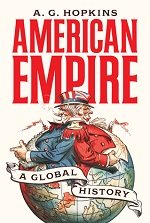American Empire: A Global History

Author: Tony Hopkins (Pembroke 1994)
Publisher: Princeton UP
This book offers a fresh approach to the history of U.S international relations during the past three centuries. The central argument holds that the United States was part of an evolving Western imperial system from the period of colonial rule to the present. This proposition is set in motion by identifying three phases of globalisation and assigning empires a starring role in the process. The transition from one phase to another generated the three crises that form the turning points the book identifies. Each crisis was driven by a dialectic, whereby successful expansion generated forces that transformed one phase and created its successor.
Far from being isolated for a large slice of its history, the United States and the leading European states followed broadly similar courses. The American Revolution was part of a common fiscal crisis that affected the leading European military-fiscal states at the close of the eighteenth century. Formal independence in 1783 did not deliver effective independence. Britain’s informal political, economic, and cultural connections continued to exert a profound influence on the new state for much of the nineteenth century. Moreover, the debate in the United States between different visions of an independent polity mirrored the debate between conservatives and reformers in Europe after 1789, and ended, as it did in much of Europe, in civil war.
It was not until the second half of the century that the United States began to achieve effective independence by building an industrial nation-state. It did so in harmony with European states, which entered the same process at the same time. As the United States developed industries, towns, and an urban labour force, it also experienced similar problems of unemployment, social instability, and militant protest. At the close of the century, the U.S. joined other European states in contributing to imperialism, which can be seen as the compulsory globalisation of the world. By 1900, Britain’s influence had receded. By then, too, Washington had entered a period of colonial rule in the Pacific and Caribbean that is one of the most neglected features of the study of U.S. history.
This phase ended with decolonisation after World War II. The world economy departed from the classical colonial model; advocacy of human rights eroded the moral basis of colonial rule; international organisations provided a platform for burgeoning colonial nationalism. The United States decolonised its insular empire between 1946 and 1959 at the same time as the European powers brought their own empires to a close. Thereafter, the U.S. struggled to manage a world that rejected techniques of dominance that had become either unworkable or inapplicable. Its status was that, not of an empire, but of an aspiring hegemon.
The book is aimed at U.S. historians who are unfamiliar with the history of Western empires, at historians of European empires who abandon the study the USA between 1783 and 1941, and at policy-makers who appeal to the ‘lessons’ history to shape the strategy of the future.